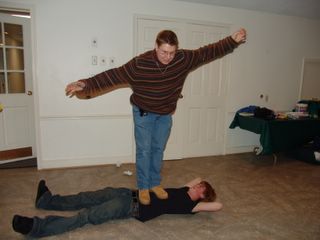Experiential Storytelling
I’ve recently finished the book Experiential Storytelling (Re)Discovering Narrative to Communicate God’s Message by Mark Miller. This was a great book which has really gotten me to rethinking how to teach others. So often we think people want to hear what we have to say, really they want to do what we’ve done. We learn best by doing and taking part, instead of being lectured to.Oddly I got through this entire book and grasped the Storytelling part without the Experiential piece clicking. It wasn’t until this past Sunday’s gospel reading that I finally understood how telling a story should be an experience for all involved.
Last Sunday we used Group’s curriculum for Vacation Bible School Fiesta! to tell the gospel reading. The congregation were the waves and the fish (after we figured out we were supposed to be fish there were some pretty funny fish faces). Others came from the congregation to be “actors” playing out the story as Bill read it. Truthfully, this was one of the most effective ways I’ve heard/experienced the story of laying down our nets, leaving our homes and giving up everything to follow Christ.
Rob’s display about needing to trust was pretty darned good too. It was all a big experience which is sticking with me days later. No offense to Rob (or the other 5 sermons I listen to a week), but I often forget even the one main point by the next day.
I wrote a newsletter article focusing exclusively on the storytelling piece. Talking about Rachel’s life and the ways she has grown based on a community which gives of themselves without asking for anything in return. My hope was that people would relate to either Rachel’s life, or the life of the community around her. I certainly relate to Rachel, my walk in faith has followed her growth from innocents and ignorance to have a lot of support by those around me, without me being able to give much back besides a smile and the love I have for people.
The biggest thing I had to get over in switching to a story instead of my thoughts for the day, was to trust that the person reading would be moved in their own way. 5 times (both at the beginning and the end) I wanted to add a statement like “Where do you see yourself in this story” but I refrained.
Mark states:
...pray and ask God to help us to trust those attending our gathering. Trust that they can understand Scripture more clearly and better retain what they have learned when they’re allowed the think for themselves.This is still hard for me. I want to ask if I can edit the article to help the reader understand what I want to say. I guess I’ll find out in a few weeks if the message was understood, or if I need to go back to the drawing board.
In any case, watching a group of 200 people, from preschool through adult retirement taking part, laughing and being a part of a story finally made me realize how important experience is in learning the story.
If you’d like to borrow it, you’re welcome to my copy. But for about $9.90 from Books-A-Million, I’d recommend supporting the author.
I’m excited to refine this. I wonder how else telling (and recreating) stories can let people know what we’re thinking more than statements are able.
Peace,
+Tom/Bob





1 comment(s):
You mean you don't remember every word I say?!
By Anonymous, at
8/05/2006 9:32 AM
Anonymous, at
8/05/2006 9:32 AM
> Post a comment
<< Home